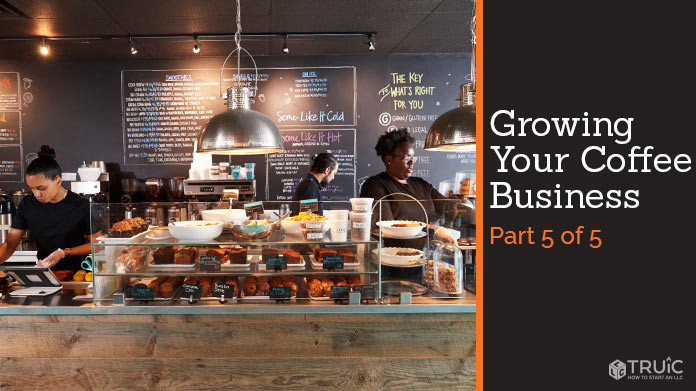Growing a Coffee Shop Business
The final part of this Starting a Coffee Business guide deals with managing the growth of a coffee business. Learn how to define growth through establishing objectives and figuring out what financial metrics to follow. You’ll also find out where to source ideas, how to implement them, how to navigate your competition, and how to keep it all in line with your personal goals.
Welcome to our How to Start a Coffee Company Guide, where we take you through the steps involved in planning, developing, opening, operating, and growing a coffee company.
Recommended: Read our full, in-depth How to Start a Coffee Shop Business guides, inspired by coffee professionals, they will help make your coffee dreams real, from sourcing beans to hiring baristas, choosing the best POS system, forming an actual company, and everything in between.

How Do You Define Growth?
In this guide, we'll cover the following business growth topics:
Subscribe to our YouTube channel
Growth can mean a number of things—a growing number of sales day-to-day, expanding into a new shop location, developing a new product line, adding new services, and much more. With this in mind, it’s really important to understand how to find what growth will look like for you and how to manage growth through financial literacy.
Many of our experts agree that if you’re looking to grow your business, you should start by slowing down at first to really get everything you’re doing now right, well-organized, and defined.
Once you have done this, you can start to focus on the stuff you want to grow while avoiding taking on too much stuff. Remember that if you try to take on too much at one time, you’ll lose your focus and end up with some close calls or catastrophic failures. One of our experts said that one thing you should at least be able to do is remember the names of your employees, what they do, and where they live.
Growth can be measured in many different ways, including new revenue streams, business efficiency optimizations, new or better equipment, or even execution on brand ideals like community involvement or solar energy usage.
No matter how you measure growth, it should be something that is consistent with your business and that serves to take you further down the road of your vision, rather than veering off into something you know nothing about. One of our experts said it best when he mentioned that some people once told him he should grow weed or brew beer. His response was a hard no—his business was only going to focus on making the best coffee they could.
However, you’ll still need to be flexible when it comes to where your vision meets reality, considering such factors as how customers perceive you, the business climate you exist in, the building you’re in, and your community. All of these things will further refine your vision and how you can actually make it work.
Need a logo for your coffee shop? Brand your small business with our Free Coffee Shop Logo Maker! You get your logo in minutes so you can immediately start branding your small business.
Financial Literacy - How to Measure and Manage Growth
As your business grows, your balance sheet will grow, meaning that both your sales and bills will grow.
While it sounds great to have increased sales, sometimes you can run into a situation where you run out of money in a matter of months if you’re not paying attention to this increased revenue balanced with your bills.
This is why you need to learn how cash flow works and how to forecast your finances. You can’t just check your bank account every day, that isn’t enough. You should know in detail what your bank account will look like for the next 30, 60, 90 days, or even further out.
Here’s a great resource for financial forecasting.
Cash flow is the total amount of money being moved in and out of a business and refers to the amount of available liquid cash a business will have at any given time.
One of our experts stated that you’ll ideally want to have at least 2 weeks of working capital, for expenses that are due including but not limited to payroll, vendor payments, and utility bills.
Where Do Growth Ideas Come From?
When you’re trying to grow your company, you’ll need to know where to find and test growth ideas and how to execute growth ideas.
Some of your business’s best growth and expansion ideas will come from you. This is because you’re the person that spends the most time with your business—you’ll know it inside out and have the vision to do what you think is best to grow it, especially when you’re just getting started.
Some ideas for business growth projects include:
- A new location
- A new coffee product to sell at retailors
- Installing a bigger roaster to improve roasting efficiency
- Expanding the distribution of a product to more stores
- A new type of merchandise
- Renovating an existing store to improve barista workflow to sell faster
- Trying out a new promotion
- Selling your roasted coffee beans outside of your shop for the first time
- Committing to sustainable energy
- Improving the ethics of how you source coffee products
- And so much more
How to Execute Your Growth Ideas
To make these ideas a reality, you’ll need to make sure you have what it takes to get it done, like:
- You need to learn or have the skills or talent
- Or, you’ll need to build a team of people with the right skills and talent to pull it off
- Enough capital in your cash flow to not run out of money
- Additional funding if you don’t have the money
- Licenses or permits to do any building or renovation work
Where to Find and Test More Growth Ideas
Some of the best ways to grow your business come from other sources; they can help to identify problems or patterns, validate what you’re thinking, and keep some of the most important people—your customers and community—involved.
Here are some growth idea gathering and testing tactics that involve sourcing ideas from your customers:
- Ask your baristas about patterns they are seeing in customer interactions
- Sit in your cafe to see if you can spot things yourself
- Ask your customers to sit in on a panel and hold the space for them to talk about your business, or even try some drinks you’ve been developing
- Read your POS system's sales reports. A smart POS system can help you gauge the trend of the market.
Another big source of feedback on what you’re doing can be from customer reviews. Sites like Google My Business and Yelp are online places many of your customers should familiar with, and where they’re likely to leave reviews. You can even implement reviews directly in your point of sale system, sending a survey to your customer’s email along with the receipt, meaning you can take action on any issues with drinks or products, and also see what your customers like, too.
Ultimately, you should have a measurement in mind for the things you want to grow in your business. Depending on your growth opportunity, this could be:
- Sales
- The number of shops your product is sold at
- The opening of a new location
- Improved barista workflow efficiency by for example one minute per drink
- Spending less time tending to a small coffee roaster by upgrading to a bigger roaster
- Improved ratings
What you do will likely have some outcome you can measure. This can be a dollar figure in sales or something you have control over like time spent on a task, the number of things installed, or many other things.
How Do You Navigate Competition?
No matter what, you’re likely going to have competition in the market you’re serving. While you should be aware of what they’re doing, you shouldn’t try to follow in their footsteps as you’ll just execute someone else’s plan, and perhaps not as well as they are suited to. Still, it doesn’t hurt to know where their footsteps fall in terms of who they serve, where your paths cross, and what they’re doing to succeed in your market.
You should mainly be focused on your business and its reputation, improving or maintaining its quality and unique appeal. If you do this, while you will still always have competition, you should be secure in your part of the market.
An example from one of our experts uses coffee beans: if you start to try and cut costs by buying lesser quality coffee beans, you’ll save at most two cents a cup. Your customers will likely notice the drop in quality buy your coffee less often or not at all, go to your competition, and tell everyone in their network about it.
But, if you’re consistent in trying to make your coffee the best it can be, those same people will take notice, visit your business more often, and make sure to tell all their friends about you!
Remember, every one of your customers wants their own coffee experience. They may want your shop one day, and another a different day. This choice is great for them and actually strengthens the business environment around you, builds a better coffee culture, and overall a stronger community.
Recommended Guide: How to Introduce Third-Wave Coffee to New Customers
Finally, you and your baristas should not talk poorly about your competitors, especially to your customers. Remember that you exist in the community that business is in, and it may be a business your customer enjoys in addition to yours. Your negativity may turn them off from visiting your shop, losing yourself a customer and potentially gaining you a bad reputation.
Recommended: Learn some Tips to Prevent a Toxic Work Environment in Your Cafe
How Do Your Personal Goals Tie In?
You and your business’s growth goals should be aligned. If they’re not you’re likely not going to want to try and achieve them. And while businesses tend to take on a life of their own, you’re ultimately the one running it, making decisions, and making the growth opportunities come true.
Coffee expert Jess Harmon had these things to say about pursuing the growth of your business:
- Perfectionism isn’t real
- Failure is acceptable
- Entrepreneurship is a long journey
- And the day you feel like you’ve come to completion is the day you should sell your coffee business and start something else
With that in mind, go forth and grow your business!


